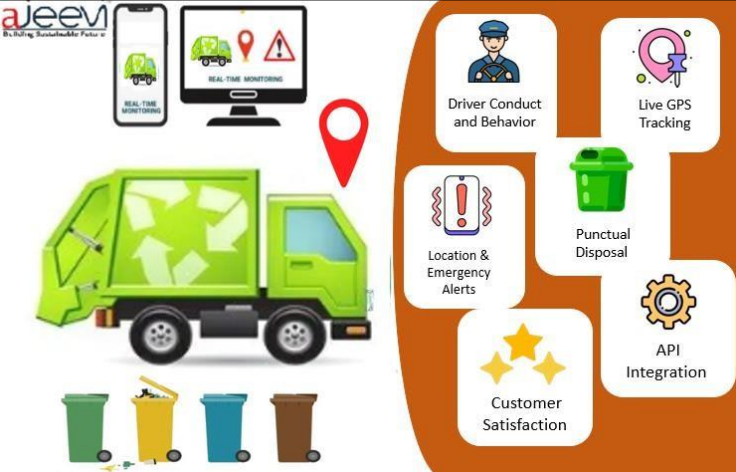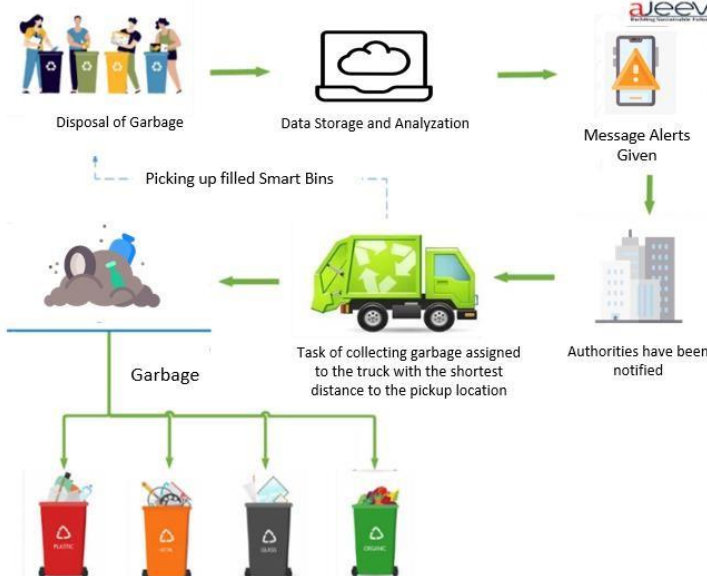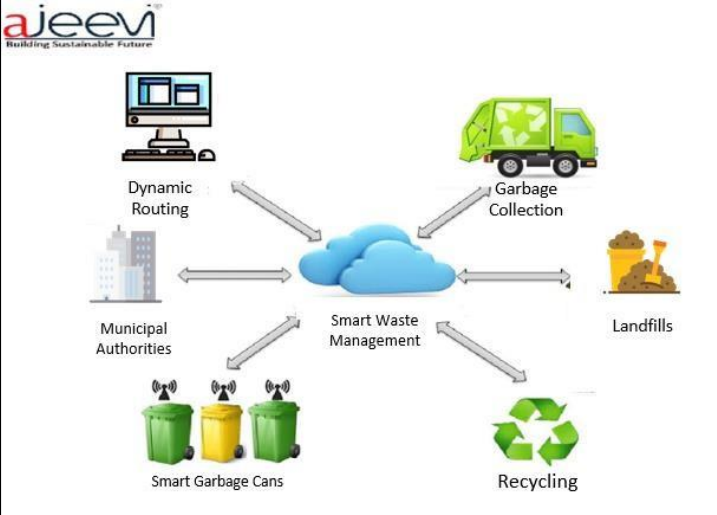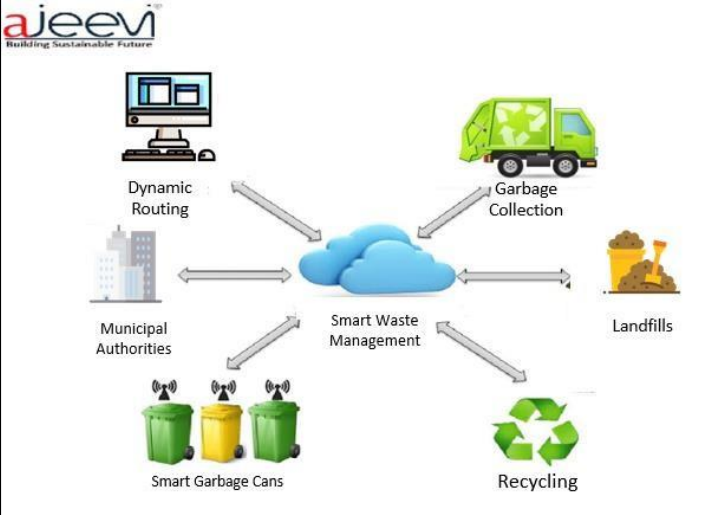Resources-> Blogs ->Smart Waste Management



Summary:
The Rapid urbanisation and industrial growth have resulted in massive garbage output, providing significant issues for effective waste management. Traditional approaches frequently fall short, resulting in environmental harm and increased operational costs. The IoT-based Smart Waste Management System tackles these difficulties by successfully monitoring and managing waste through a network of sensors, data analytics, and automated technology. Real-time waste data allows for more efficient collection, dynamic routing, and lower fuel use. The technology improves recycling by precisely sorting garbage at the source, as well as providing insights into waste generation trends to inform policy formulation. Improved efficiency, cost savings, lower emissions, increased recycling rates, greater public health and safety, data-driven decision-making, and higher customer satisfaction are all significant benefits. RFID and QR codes, for example, help to streamline operations by marking assets, collecting data, centralising monitoring, sending automatic alerts, optimising routes, and integrating with waste collection facilities.
Smart Waste Management: Enhancing Efficiency Through RFID and QR Code Technologies in the IoT Era :

The process begins with the tagging and registration of waste bins or containers. RFID tags and QR codes are affixed to each bin, providing a unique identifier. This information is recorded in the waste management system, associating each tag with specific details such as bin size, location, and collection schedule.
Data Encoding and Linking:RFID tags are encoded with unique identification numbers, while QR codes store information that can be quickly scanned. Both technologies link the physical waste bin to a digital record in the central waste management database. This ensures a seamless connection between the physical assets and their corresponding data in the digital realm.
Sensor Deployment:IoT sensors, typically integrated with RFID readers or QR code scanners, are installed in waste collection vehicles. These sensors are responsible for capturing data from the RFID tags or QR codes on the bins. They can detect the fill levels, location, and status of each bin in real-time.
Data Collection and Transmission:As waste collection vehicles traverse their routes, the deployed sensors capture data from the RFID tags or QR codes on the bins. This data, including fill levels and geospatial information, is transmitted in real-time to the central waste management system via a secure network.
Centralized Monitoring and Analytics:The central waste management system processes the incoming data, offering a comprehensive view of the entire waste management network. Municipal authorities or waste management companies can monitor the fill levels of each bin, track collection vehicle routes, and analyze historical data to optimize collection schedules and routes.
Automated Alerts and Notifications:When a waste bin reaches a predefined fill level, the system triggers automated alerts and notifications. These notifications can be sent to waste collection teams, indicating that specific bins need immediate attention. This proactive approach minimizes the likelihood of overflowing bins and optimizes collection efficiency.
Route Optimization and Planning:Leveraging the data collected through RFID and QR code technologies, the waste management system employs analytics to optimize collection routes. This ensures that collection vehicles follow the most efficient paths, reducing fuel consumption, minimizing environmental impact, and enhancing overall operational efficiency.
Maintenance and Quality Assurance:The system facilitates proactive maintenance by flagging any anomalies or issues with the RFID tags, QR codes, or sensors. Regular quality assurance checks ensure the accuracy and reliability of the IoT-enabled waste management infrastructure.
Reporting and Documentation:The central system generates comprehensive reports, detailing fill levels, collection frequencies, route efficiency, and other relevant metrics. These reports aid in decision-making, resource allocation, and strategic planning for continuous improvement.
Integration with Waste Sorting Facilities:In advanced waste management systems, data from RFID-tagged or QR-coded waste bins can be integrated with waste sorting facilities. This integration streamlines the sorting process, improving recycling efficienctly.
The widespread implementation of smart waste management systems represents a transformative potential to solve the inefficiencies and environmental consequences of traditional waste management procedures. Smart waste management systems can optimise waste collection routes, save operational costs, and improve recycling efforts by leveraging advances in IoT, AI, and data analytics. These systems support real-time monitoring and predictive analytics, resulting in more efficient resource allocation and proactive maintenance of waste management infrastructure. Furthermore, clever recycling systems can improve resource recovery rates, diverting more waste from landfills and encouraging a circular economy.
Ajeevi Technologies provides innovative and customized solutions in the areas of smart cities, internet of things (IoT), and sustainable development which include:
IoT-enabled Solutions
Ajeevi Technologies has developed IoT-enabled solutions to improve the functioning of cities. Ajeevi offers a range of solutions like smart parking, smart street lighting, smart waste management, and smart water management systems that are connected to the internet and can be monitored and managed remotely.
Sustainable Energy Solutions
Ajeevi Technologies is focused on developing sustainable energy solutions for smart cities and provide solutions that are energy-efficient and rely on renewable energy sources such as solar and wind power.
Data Analytics
Ajeevi Technologies uses data analytics to gather and analyze data to provide insights into the functioning of the city. Ajeevi uses this information to optimize operations, improve service delivery, and make data-driven decisions.
Citizen Engagement
Ajeevi Technologies is committed to citizen engagement and involving citizens in the planning and implementation of smart city solutions. Ajeevi has developed platforms for citizen engagement, including mobile apps, web portals, and social media, which enable citizens to provide feedback, report issues, and participate in decision-making.
Overall, Ajeevi Technologies’ contributions to smart city solutions are aimed at making cities more sustainable, efficient, and citizen-friendly. Our innovative solutions, focus on sustainability and citizen engagement make them a valuable player in the smart city space. http://www.ajeevi.com


Android Handheld UHF Reader
Automatic Boom Barrier
Automatic Number Plate Reader Camera
Bin Level Sensor
Bio Metrics Machine
Bullet Camera Live
Chlorine Sensor
Data Transmission Unit
Emergency Call Box
Environment Sensor
Face Recognition
Flood Sensor
Fuel Sensor
Galvanized Iron Pole
Gi-Pole
GPS
GPS-AIS140
Handheld HF Reader
Handheld UHF Reader
PTZ Camera
Public Address Speaker
Public Address System
Hydraulic Boom Barrier
IP Bullet Camera
IRIS
Magnetic Sensor
Network Rack
Network Video Recorder
Panic Button
Parking Entry Exit UHF Reader Vehicle Mounted UHF Reader
Passenger information systems
Ph Sensor
Refrigerator Sensor
RFID Tag – HF
RFID Tag – UHF
RFID Tag Metal – UHF
Smart Kiosk
Smart Pole
Soil Sensor
Drainage Sensor
Temperature Sensor
Turbidity Sensor
Ultrasonic Flow Meter Variable Sign Board Weigh Bridge Entry Exit Reader
Thanks for ” Downloading”, “Discovering”, “AJEEVI Products”, hit the submit button requisite information will be in your email box shortly.
Ajeevi Offer “Enterprise IoT Solutions” with in-house R&D, Capability of manufacturing IOT devices.
505, Tower A-1, Corporate Park
Noida 201301, Uttar Pradesh India
presales@ajeevi.com
+91-9654323500